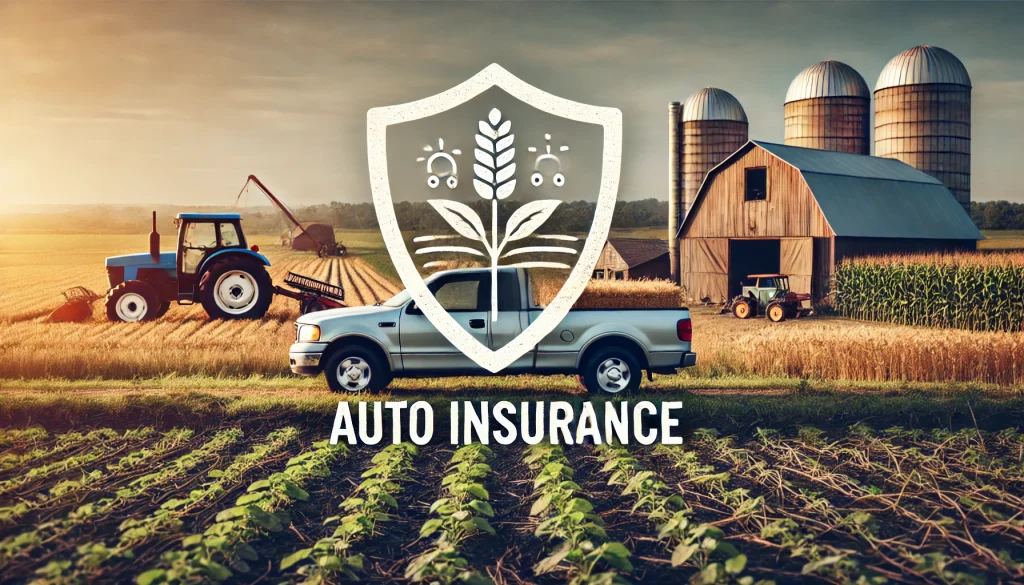Auto Insurance for Farmers
Farming is the backbone of America, and farmers rely heavily on vehicles to run their operations. From pickup trucks to farm-use vehicles, ensuring they are protected is crucial. This guide dives into the specifics of auto insurance for farmers, highlighting the unique coverage options, benefits, and tips to safeguard your most essential equipment. Whether you’re managing a small family farm or a large-scale operation, having the right auto insurance provides peace of mind and financial security.
Why Farmers Need Specialized Auto Insurance
Standard auto insurance may not meet the needs of farmers, whose vehicles are often used in unique ways. Farm vehicles are not just for commuting—they transport goods, tow equipment, and navigate rough terrain. These specialized uses create risks that require tailored insurance coverage.
Farm-use auto insurance is designed to cover vehicles that play a critical role in daily farming activities. Coverage typically extends to farm trucks, trailers, and even ATVs used for operational purposes. This ensures you’re protected whether hauling produce to market or transporting heavy machinery.
Additionally, farmers often face risks that standard policies overlook. For instance, vehicles used on private farmland or rural roads might encounter unique hazards, such as equipment damage or collisions with livestock. Comprehensive policies address these concerns, providing broader protection than standard auto insurance.
Key Coverage Options for Farmers
When selecting auto insurance for farmers, it’s important to understand the available coverage types. Here are the key options:
Liability Coverage: Required by law, this covers damages and injuries caused to others in an accident. Farmers may need higher limits due to the potential risks associated with transporting heavy equipment or materials.
Collision Coverage: Protects your vehicle from damages caused by accidents, whether on the road or on the farm.
Comprehensive Coverage: Covers non-collision incidents like theft, vandalism, or weather-related damage. This is essential for vehicles exposed to the elements on a daily basis.
Uninsured/Underinsured Motorist Coverage: Protects you if you’re involved in an accident with a driver who lacks adequate insurance.
Farm Vehicle Endorsements: Many insurers offer specific endorsements for farm vehicles, extending coverage to trailers, tractors, or other equipment transported by your vehicle.
Understanding these coverage types ensures your policy aligns with your farm’s operational needs, providing the comprehensive protection required to keep your business running smoothly.
How to Choose the Right Auto Insurance for Farmers
Selecting the right insurance policy involves evaluating your farm’s unique requirements. Here are steps to guide your decision:
1. Assess Vehicle Use: Determine which vehicles are used exclusively for farm operations and which serve dual purposes. Policies for personal-use vehicles may differ from those for farm-use vehicles.
2. Evaluate Risks: Consider the risks associated with your farming activities. If you frequently transport heavy machinery, ensure your policy includes higher liability limits and equipment coverage.
3. Compare Providers: Work with insurers familiar with agricultural needs. Local providers often understand the specific challenges faced by farmers and can recommend tailored policies.
4. Explore Discounts: Many insurers offer discounts for bundling farm auto insurance with other policies, such as farm property or crop insurance. Ask about available savings to reduce costs.
By taking these steps, farmers can secure a policy that provides comprehensive protection at an affordable price.
Common Challenges Farmers Face with Auto Insurance
While auto insurance is essential, farmers often encounter unique challenges when securing coverage:
1. High Premiums: Due to the specialized nature of farm vehicles, premiums can be higher than standard auto policies. This makes finding affordable options critical.
2. Coverage Gaps: Standard policies may not cover all farm-related risks, such as equipment damage during transport or accidents on private farmland.
3. Seasonal Variability: Some farm vehicles are used seasonally, leading to questions about whether year-round coverage is necessary. Discussing these details with your insurer can prevent overpaying.
Addressing these challenges requires working closely with knowledgeable agents who can customize policies to fit your farm’s needs.
Tips for Saving on Farm Auto Insurance
Managing insurance costs is essential for farmers operating on tight budgets. Here are strategies to save on your policy:
Bundle Policies: Combining farm auto insurance with other policies, such as home or equipment insurance, often leads to discounts.
Choose Higher Deductibles: Increasing your deductible reduces monthly premiums. Ensure you have the funds to cover the deductible if needed.
Maintain a Clean Record: Safe driving minimizes risks and qualifies you for lower premiums.
Use Seasonal Coverage: For vehicles used only part of the year, explore seasonal policies that provide coverage when you need it most.
Compare Quotes: Shopping around ensures you’re getting the best rate for the coverage you need.
Implementing these tips can help you balance comprehensive protection with affordability, ensuring your farm operates efficiently without unnecessary expenses.
FAQs
1. What types of vehicles are covered under farm auto insurance?
Farm auto insurance typically covers trucks, trailers, ATVs, and other vehicles used for farming operations. Personal-use vehicles may require separate policies.
2. Is farm auto insurance more exp






